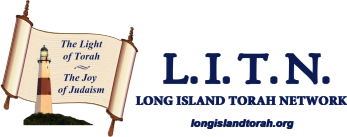Naso
Parshas Nasso begins with G-d commanding Moses to count the families of Gershon and Merari, two of the three sons of Levi. The Sons of Gershon were responsible for transporting the fabric components of the Mishkan (Tabernacle): its roof, the walls of the courtyard, and the entrance curtains. The Sons of Merari were in charge of the wooden beams which comprised the walls of the Mishkan and held up the curtains around the courtyard and in the entryways. (The third family, the Sons of Kehas, were counted in last week’s Parsha, Bamidbar. Their charge was the furniture of the Mishkan – the Ark, Menorah, Table and Altars.)
The Torah presents the law of Sotah – a suspected adulteress, who is put to a miraculous test: a Kohen places a parchment inscribed with Torah verses into a container of water, erasing the sacred words. The woman drinks the water; if she has been unfaithful she is miraculously punished, while an innocent woman will not only survive but experience unprecedented blessing in her life. Restoring marital harmony is so important that G-d allows His own holy Name to be erased in the course of this procedure, enabling husband and wife to re-unite in peace.
The Parsha continues with the laws of the Nazir – a special vow obligating one to avoid haircuts, wine and all other grape products, and contact with the dead. The conclusion of the Nazir’s term of abstinence is marked by a special ceremony marking his reentry to life as an ordinary citizen. The section of Nazir is juxtaposed to the previous one to indicate the direct connection between indulgence in wine and adultery; recognition of human frailty should motivate us to enact personal safeguards against sin.
G-d communicates to Moses the formula for the Priestly Blessing – Birkas Kohanim. (In the Land of Israel, the Priestly Blessing is part of daily communal prayer, as it is in Sephardic communities the world over. For reasons not entirely clear, Ashkenazic communities outside of Israel reserve the recitation of the Priestly Blessing for Biblical Holidays.)
May Hashem bless you and protect you; May Hashem show you a glowing countenance and grant you favor; May Hashem deal favorably with you and grant you peace.
The end of the Parsha returns to the dedication of the Mishkan. The Nasi, or prince, of each of the Twelve Tribes brought a special celebratory offering. The twelve offerings were identical; yet, remarkably, the Torah enumerates each one individually, repeating the same description twelve times. Though outwardly they seemed the same, each represented a unique personal sentiment, and held unique significance to G-d.
Click below to open a printable pdf
The Torah presents the law of Sotah – a suspected adulteress, who is put to a miraculous test: a Kohen places a parchment inscribed with Torah verses into a container of water, erasing the sacred words. The woman drinks the water; if she has been unfaithful she is miraculously punished, while an innocent woman will not only survive but experience unprecedented blessing in her life. Restoring marital harmony is so important that G-d allows His own holy Name to be erased in the course of this procedure, enabling husband and wife to re-unite in peace.
The Parsha continues with the laws of the Nazir – a special vow obligating one to avoid haircuts, wine and all other grape products, and contact with the dead. The conclusion of the Nazir’s term of abstinence is marked by a special ceremony marking his reentry to life as an ordinary citizen. The section of Nazir is juxtaposed to the previous one to indicate the direct connection between indulgence in wine and adultery; recognition of human frailty should motivate us to enact personal safeguards against sin.
G-d communicates to Moses the formula for the Priestly Blessing – Birkas Kohanim. (In the Land of Israel, the Priestly Blessing is part of daily communal prayer, as it is in Sephardic communities the world over. For reasons not entirely clear, Ashkenazic communities outside of Israel reserve the recitation of the Priestly Blessing for Biblical Holidays.)
May Hashem bless you and protect you; May Hashem show you a glowing countenance and grant you favor; May Hashem deal favorably with you and grant you peace.
The end of the Parsha returns to the dedication of the Mishkan. The Nasi, or prince, of each of the Twelve Tribes brought a special celebratory offering. The twelve offerings were identical; yet, remarkably, the Torah enumerates each one individually, repeating the same description twelve times. Though outwardly they seemed the same, each represented a unique personal sentiment, and held unique significance to G-d.
Click below to open a printable pdf
| parsha_snapshot_naso.pdf | |
| File Size: | 654 kb |
| File Type: | |

